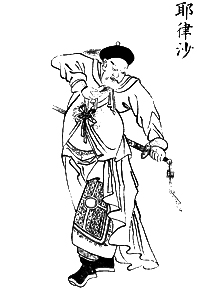Emperor Shengzong of Liao, personal name Wenshunu, sinicised name Yelü Longxu, was the sixth emperor of the Khitan-led Chinese Liao dynasty and its longest reigning monarch.
Emperor Daozong of Liao, personal name Chala, sinicised name Yelü Hongji, was the eighth emperor of the Khitan-led Liao dynasty of China.
Emperor Xingzong of Liao, personal name Zhigu, sinicised name Yelü Zongzhen, was the seventh emperor of the Khitan-led Liao dynasty of China.
Emperor Shizong of Liao, personal name Wuyu, sinicised name Yelü Ruan, was the third emperor of the Khitan-led Liao dynasty of China. He was the son of Yelü Bei, the eldest son of Abaoji, the founder of the Liao dynasty. He ascended to the imperial throne in 947 after the death of his uncle, Emperor Taizong, who raised him in his father's absence.
Emperor Jingzong of Liao, personal name Yelü Xian, courtesy name Xianning, was the fifth emperor of the Khitan-led Liao dynasty of China. He improved government efficiency and reduced corruption. He was known with going to war with the Northern Song dynasty. He died during a hunting trip and his wife later served as regent over his still 11-year-old son, the later Emperor Shengzong.

The Sixteen Prefectures of Yanyun comprise a historical region in northern China along the Great Wall in present-day Beijing, Tianjin, and part of northern Hebei and Shanxi. It was a site of constant military and political conflict between various dynasties from the end of the Tang dynasty until the establishment of the Yuan dynasty.
Yelü Bei, also known as Yelü Tuyu, posthumously honored Emperor Wenxian Qinyi (文獻欽義皇帝) with the temple name Yizong, formally known as Renhuang Wang during his lifetime, known as Dongdan Muhua (東丹慕華) (931) and then Li Zanhua (李贊華) (931–937) as a Later Tang subject, was the eldest son of Emperor Taizu of Liao, the founder of the Liao dynasty. He was declared successor to the Emperor Taizu in 916, but never succeeded to the throne. Rather, after the accession of his younger brother Yelü Deguang, he fled to the Shatuo-led Later Tang dynasty, where he was killed in 937.
Empress Xiao may refer to:
Yaonian Yanmujin or Xiao Yanmujin, formally Empress Xuanjian (宣簡皇后), was an empress dowager of the Khitan-led Chinese Liao dynasty. She was the mother of Liao's founder Emperor Taizu of Liao and the wife of his father Yelü Saladi (耶律薩剌的). During the reign of Emperor Taizu's son Emperor Taizong, she was grand empress dowager.

Yelü Sha, courtesy name Anyin (安隱), of the Yelü clan was a Khitan general and statesman in imperial China's Liao dynasty.
Empress Dowager Xiao (蕭太后) may refer to:
Yelü Lihu (耶律李胡) (911-960), also named Honggu (洪古), courtesy name Xiyin (奚隱), formally Emperor Zhangsu (章肅皇帝), was an imperial prince of the Khitan-led Liao dynasty. As the third son of Liao's founding emperor Emperor Taizu and his wife Empress Shulü Ping, Yelü Lihu served as crown prince during the reign of his older brother Emperor Taizong, who was their second son, as Empress Shulü wanted him to be emperor after Emperor Taizong. However, after Emperor Taizong's death, their older brother Yelü Bei's son Yelü Ruan was able to defeat Yelü Lihu in battle and take the throne. Yelü Lihu was put under arrest and later died while under arrest.
Xiao Noujin was a Khitan empress dowager of China's Liao dynasty. She was a concubine of Emperor Shengzong, the mother of Emperor Xingzong, and one of the three Liao grand empresses dowager. She had great influence after the accession of her son the throne in 1031.
Xiao Hunian, also known as Hehan (和罕) was a Khitan noble lady of imperial China's Liao dynasty. She was one of the Xiao sisters and the oldest sister of Lady Xiao and Xiao Yanyan.
Lady Xiao, also known as Yileilan (伊勒兰) was a Khitan noble lady of imperial China's Liao dynasty. She was one of the Xiao sisters along with Xiao Hunian and Xiao Yanyan.
Han Derang, known for his Khitan name, Yelü Longyun, Xingning, or Yaoge was a Chinese politician. He served as the Prime Minister of Liao Dynasty during the reign of Empress Xiao Chuo. He was a native of Hebei Yutian (祖籍河北玉田) and born into the Shihou Family.
Xiao Siwen was a Chinese politician who served as the chancellor and northern commissioner for military affairs of the Liao dynasty. He was the father of Xiao sisters. However, for the sake of the overall situation and family glory, he agrees to make his youngest daughter Xiao Yanyan married with Yelü Xian and in 969, after Yanyan become the Liao Empress, Xiao then honoured as King of Wei (魏王). Later, when he an accompanied Xian Siwen on the hunt, he was assassinated by Gao Xun's people.
Yelü Lübugu or known by the title Princess of Yan State, was a Liao dynasty princess and the first daughter of Emperor Taizong of Liao. She then married Prime Minister Xiao Siwen and bore him the three Xiao Sisters. However, she died from her illness. Her youngest daughter Xiao Yanyan married with Yelü Xian and in 969 and become the Liao empress. The Xiao family was the consort kin of the Liao dynasty, all future empresses and imperial brides originating from this faction.
Han Kuangsi was a physician and minister of the Liao dynasty. He wrote The Epitaph of Han Kuangsi (韩匡嗣墓志), which was discovered in the Bairin Left Banner in 1995.
Ding Lingguang, formally known as Empress Dowager Mu (穆皇太后), was an imperial concubine of Xiao Yan, Emperor Wu of Liang Dynasty. She was a native of Qiao County (谯国), today's Bozhou City, Anhui Province.


